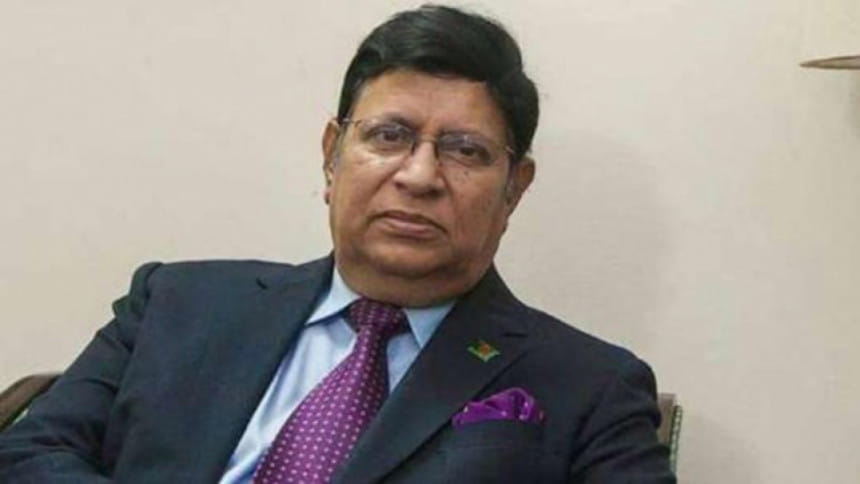‘Other nations should share responsibility’

Pointing to the international community's continuous call upon Bangladesh to shelter Rohingya people who arrive floating on boats at Bay of Bengal, the country's Foreign Minister Dr AK Abdul Momen said other countries of the region are not being requested to share the burden.
The minister urged all countries to take effective steps quickly to resolve the Rohingya crisis.
He conveyed the message when British Minister of State for the Commonwealth and the United Nations Lord Ahmad made a phone call to him on Monday requesting Bangladesh to give shelter to floating Rohingyas at Bay.
"Despite limited resources, Bangladesh has already given shelter to around 1.1 million Rohingyas on humanitarian ground. The small number of 500 floating Rohingyas are not in the country's territory," he said.
Talking to UNB, a diplomat said it is the responsibility of surrounding countries of the Bay of Bengal and the Andaman Sea to share the responsibility and help the distressed people.
There are eight countries -- Myanmar, India, Thailand, Sri Lanka, Malaysia, Singapore, Indonesia and Bangladesh -- in the Bay of Bengal region.
Foreign Minister Dr Momen said though Bangladesh was requested to give shelter to floating Rohingyas on humanitarian grounds, other countries in the region were not requested to do the same thing.
He asked the UK Minister to shelter the floating Rohingyas by sending their [UK] royal ship.
UNHCR SEEKS GREATER COORDINATION AMONG STATES
Earlier, UNHCR, the UN Refugee Agency, sought greater coordination and responsibility-sharing by states to address the maritime movements of refugees and asylum-seekers in the Bay of Bengal and Andaman Sea saving lives.
"We're increasingly concerned by reports of failure to disembark vessels in distress and of the grave immediate risk this poses to the men, women and children on board," said Indrika Ratwatte, Director of the Regional Bureau for Asia and the Pacific of UNHCR.
The UNHCR official said saving lives at sea must be a collective effort in which any one state that rescues and disembarks refugees can draw on resources pooled from other states in the region.
Rescue at sea and allowing the persecuted to seek asylum are fundamental tenets of customary international law, by which all states are bound, said the UN agency.
Beyond the current Covid-19 crisis, Ratwatte said, a predictable and humane disembarkation approach will remain critical. "UNHCR is calling on all states to uphold these lifesaving obligations to refugees and asylum-seekers," she said.
In the context of the unprecedented current Covid-19 crisis, the UNHCR official said, all states must manage their borders as they see fit.
"But such measures shouldn't result in the closure of avenues to asylum, or of forcing people to return to situations of danger. UNHCR stands ready to support governments in carrying out responsible disembarkation procedures and quarantine measures to ensure that public health issues are addressed," she added.
Ratwatte said the challenge of irregular movement is not unique to Asia.
Refugees and asylum-seekers move through unofficial and often inherently risky channels because it is the only option available to them. The reality for many refugees is that persecution and threats to their lives and well-being are more immediate than Covid-19.
HUMAN RIGHTS BODIES NOT VOCAL: MOMEN
Meanwhile, Foreign Minister Momen said military operation is still going on in Myanmar and Rohingya people are losing lives.
A few days ago, Rohingyas tried to enter Bangladesh territory and more may attempt to enter the country, Dr Momen said.
Despite this, he said, countries under the European Union are investing in Myanmar and human rights organisations are not being vocal enough about the issue.
Meanwhile, the minister also sought support from the UK Minister to come forward and help migrant Bangladeshi workers. He said developed nations including the UK should remain vocal so that Bangladeshi citizens abroad get back their jobs.
Dr Momen sought support from the UK to not cancel export orders in ready-made garments industry and urged the UK to create special fund to keep the orders uninterrupted.

 For all latest news, follow The Daily Star's Google News channel.
For all latest news, follow The Daily Star's Google News channel. 



Comments